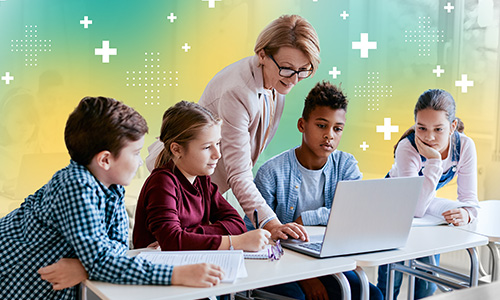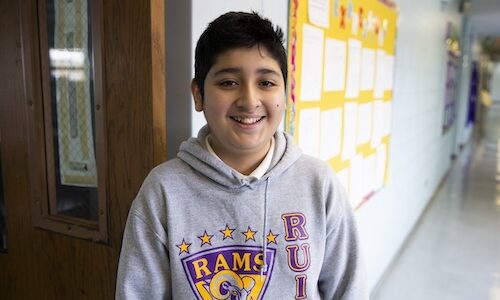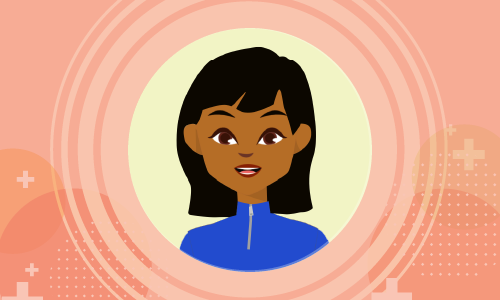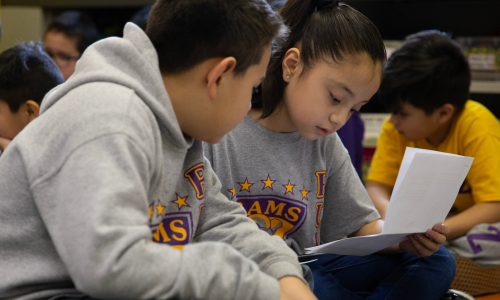At Khan Academy, our goal has always been to pinpoint where students are in their learning so we can help them close their learning gaps or move ahead if they’re ready to advance. We also want teachers to feel empowered and to know—with confidence—where students are in their journey. We want them to be able to use their expertise to intervene effectively and create personalized learning plans for their students.
That’s why partnering with NWEA to create MAP® Accelerator™ is so exciting for us. But I’m getting ahead of myself. Let me start at the beginning.
You can’t build a house on a shaky foundation
When this country moved to mass public education, we transformed society. But we also had to make compromises. Providing personalized, mastery learning became a challenge. With one teacher for every 35 students, for example, it’s extremely difficult for teachers to cater to the needs of every kid. Let me illustrate this point with a quick video.
Enter my inspiration: My cousin Nadia
Back in 2004, the furthest thing from my mind was entering the education market and someday partnering with NWEA to take mastery learning to the next level.
I was living in Boston at the time. My 12-year-old cousin, Nadia, was having trouble in math back home in Louisiana and took me up on the offer to tutor her. Slowly but surely, she got what was tripping her up: unit conversion. She even got a little ahead and was placed in an advanced class. I was hooked on teaching.
MAP Accelerator gives both teachers and students agency to teach and to learn and to grow.
I started working with Nadia’s younger brothers and, before long, I found myself tutoring more than a dozen cousins and family friends all over the country most days after work. Even at that early stage, I saw a common pattern: The reason my students were having trouble wasn’t because they weren’t bright. It wasn’t because the subject matter was difficult. It wasn’t because they didn’t have amazing, dedicated teachers. It was because they all had gaps that had accumulated over the years. Gaps even the most heroic of educators would find it difficult to fill in a classroom of more than 30 students with diverse needs.
Fast forward a bit and I’d built a program that generated problems for the kids I was tutoring. That was the first Khan Academy. Fast forward a bit more, and I was posting videos to YouTube. It soon became clear that people who were not my cousins were watching. So I quit my day job and filled out the IRS paperwork for starting a not-for-profit.
Today Khan Academy is much more than just me. We have a team of 230 employees, and more than 200,000 teachers in the US use us in their classrooms. Eighteen million learners use Khan Academy every month worldwide.
Khan Academy meets MAP Growth
When I first learned about NWEA, I quickly recognized MAP® Growth™ for what it is: the gold standard of interim assessment and measuring growth. The opportunity to form a partnership, to have both organizations bring their best to the game, felt like the best choice for educators and students.
The reason my students were having trouble wasn’t because they weren’t bright [or] because they didn’t have amazing, dedicated teachers. It was because they all had gaps that had accumulated over the years. Gaps even the most heroic of educators would find it difficult to fill.
MAP Accelerator gives every student the chance to practice skills at their own level. It lets kids get the support they need and work at their own pace. It empowers teachers to immediately activate MAP Growth data and plan interventions for their kids. And it gives both teachers and students agency to teach and to learn and to grow.
It was designed with administrators in mind, too. Dashboards make it easy for leaders to see progress and replicate best practices across a school or even a district.
What’s really powerful about our partnership with NWEA is that as two not-for-profits, we always truly have one bottom line: students. I’m beyond excited about our potential to move the dial in education in a really measurable way alongside you, the educators who work with kids each and every day.









